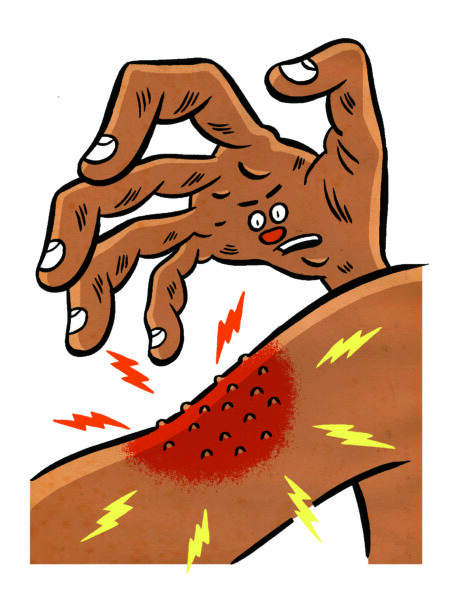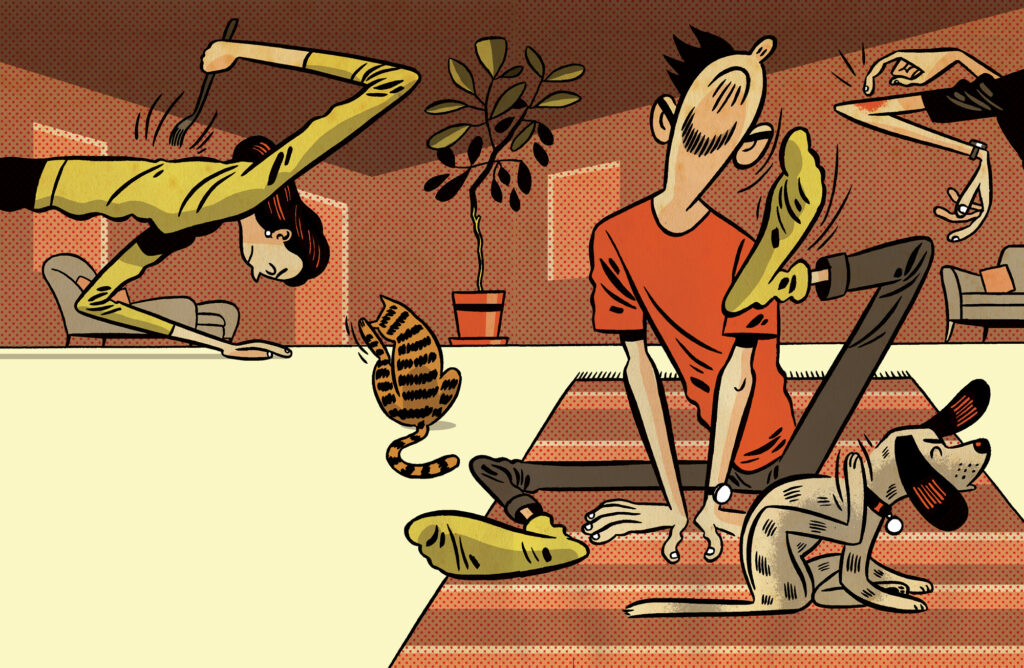By Stephanie Dolgoff
Illustrations by Jason Ford
Everybody experiences itch sometimes. Itchy skin is common, and when it becomes chronic, it can be as bad as pain — or even worse. While some aspects are still a mystery, scientists are learning more about the causes and mechanisms of itchy skin, including when it might be a sign of skin cancer.
If you ask me how I’m feeling at any given moment, odds are, the answer will be itchy. And if you don’t find some excuse to get away from me, there’s a good chance you’ll hear where on my body it itches, how intensely and (if we’re stuck in an elevator and really bored), I may show you the welt, hive, rash or bug bite that I’m at that very moment trying not to scratch. I was the kid at summer camp with the splotches of bubblegum-pink calamine all over my arms and legs; the newlywed whose honeymoon in Sicily included a romantic game of “What Did Stephanie Eat to Cause Her Lips to Itch?”; and who, in my late 40s, finally learned that beeswax, a common ingredient in lipstick, mascara and other cosmetics, gives me dermatitis and makes my eyes red, oozy and so itchy that I have to sit on my hands.
Bug bites and allergy-type reactions — itchy skin caused by something outside of yourself — are one thing. Itchy skin that seems to come out of nowhere, when you haven’t eaten anything unusual or tried a new laundry detergent, can be more puzzling, and potentially more important to escalate beyond an over-the-counter cream. That’s because itching may be a window into your health, and it’s not always minor. Whole-body itching can be a symptom of liver or kidney disease, thyroid problems and other underlying illnesses, and inflammatory itching could be an allergy, eczema, psoriasis or any number of dermatologic conditions.
This may surprise you, but: Itching can also be associated with skin cancer. In fact, research shows that skin cancer itches around 40 percent of the time, says dermatologist Gil Yosipovitch, MD, director of the Miami Itch Center at University of Miami Miller School of Medicine.
Indeed, one of my sprints to the dermatologist over the years was a mole that had started to itch, and I feared melanoma. Turns out, the “itchy melanoma mole” maxim is mostly myth: “You hear, ‘If a mole is itchy, it’s a melanoma,’ and this is incorrect,” says Dr. Yosipovitch, who has been called “the Godfather of Itch.” He has been researching the causes and treatments of itching for decades and was chair of the Organizing Committee of the 12th World Congress on Itch in Miami in November 2023. “I’m not saying it can’t happen, and if there is irritation to a mole it could be itchy, but our data suggests that, in general, you won’t see itching with melanoma.”
But itching may well be a symptom in nonmelanoma skin cancers, primarily basal cell carcinoma (BCC) and squamous cell carcinoma (SCC), the two most common types. For one study, Dr. Yosipovitch and his colleagues asked patients coming to have their skin cancers removed to fill out a lengthy questionnaire about any pain or itch they felt and how bad it was, and researchers also looked at how inflamed the cancer appeared and how deep into the skin it had grown. Participants were mostly folks with BCC and SCC, but also a few with melanoma. Around 37 percent of the skin cancers were itchy, whereas around 28 percent were painful, and most of the people with melanoma didn’t feel either.
Actinic keratosis, or AK, a common precancerous skin change that can lead to SCC, may also itch. You may feel an AK before you see it, as a rough, crusty or scaly area. “I see AKs on my patients all the time, and many of them mention that these patches have felt irritated and itchy, says dermatologist Deborah S. Sarnoff, MD, president of The Skin Cancer Foundation. “It may help me make a diagnosis.”
That’s why it’s important to pay attention not only to the way your skin looks, but how it feels, specifically if it itches. All in all, says Dr. Yosipovitch, “Itch is more common in basal cell carcinoma, and pain is less likely, while pain is predominant in squamous cell carcinoma.” But SCC can also itch. If you notice any spot on your skin that feels rough to the touch and is irritated, itchy and doesn’t heal, it’s important to see your dermatologist and have it checked.
Exactly why skin cancer itches, however, is still not clear. “To be completely honest, I don’t think there is a lot known about what causes itch from BCC or SCC,” says dermatologist Brian Kim, MD, top itch researcher and the director of the Mark Lebwohl Center for Neuroinflammation and Sensation at Mount Sinai Hospital in New York City. At minimum, explains Dr. Kim, aka @itchdoctor on social media, there are three different mechanisms involved. One might be inflammatory itching (BCCs can look pink and raised, or like a sore that doesn’t heal, and SCCs can be crusty, scaly patches). “But at the same time, you know that with cancer, there is a lot of tissue remodeling and misdirection of the nerves,” which may cause itch. And epithelial cells on the surface of the skin that are becoming cancerous could also trigger itch.
What Does It Mean to Itch?
One thing that’s clear is that itching is very complicated. That’s because the sensation of itching has innumerable potential causes or underlying conditions, complex and varied neural pathways from trigger to perception, and the involvement of multiple regions in the brain and systems in the body. Yes, we’ve really only scratched the surface of understanding itching. According to an article in the journal Immunity, the definition of itch (“an unpleasant sensation that provokes the desire to scratch”) was first used by a German physician in 1660. Studies have shown that people with chronic pruritus (the clinical term for itch) lose quality of life comparable to those with chronic pain. It’s only in the last 20 years or so that the basic mechanisms of itching have begun to be understood.
Before then, itching was thought to be a form of pain. But when researchers discovered the first of several itch-specific pathways in the nervous system, the idea that itching is its own thing began to take hold. This is all big news for people who suffer from itching that’s considered chronic (lasting six or more weeks): With greater understanding of whether an itch is pruriceptive (caused by, say, an agent in the saliva of a biting bug), neuropathic (from an injury to your nerves, such as the shingles virus causes), neurogenic (as when liver disease or certain cancers trigger a change to your central nervous system) orpsychogenic (that is, primarily caused or worsened by a psychological issue, such as obsessive compulsive disorder), scientists hope to develop treatments that can intercept itch messages to the brain or block specific itch receptors to provide targeted relief.
Who Is Itchier?
Dr. Kim says the majority of the people who come to him with chronic itch are older. “When you look at the incidence of itching across age, there’s a huge, exponential leap around age 60,” he says. There are several reasons for this: As you get older, your immune system becomes less robust (leaving you vulnerable to conditions associated with itching) and your skin becomes thinner and drier, which makes it more permeable. “You may not have a true allergy, but irritants can go right through,” he says.
In older patients, there might be an element of neurodegeneration as well. “When you get older, you can’t taste as well, can’t see as well and can’t hear as well,” Dr. Kim explains. It may be, he says, that your sense of touch becomes less sensitive over time. You’d think this would mean you’d get less itchy, but that’s not how Dr. Kim believes it works. Rather, as your sense of touch is less acute, “a default sensation becomes itch and it goes unchecked,” he says. “It’s hard to prove that, and it has yet to be proven, but I think that’s what’s going on.”
Recent research has also found that Black patients tend to be diagnosed with more itchy inflammatory skin conditions and have worse symptoms and distress because of chronic itching. This may be partly because of a tendency toward increased water loss and fewer moisturizing fatty acids in skin of color, as well as genetic and immunological factors.
There is even a possible role of melanin (the pigment that gives skin its color) in itch, says Dr. Yosipovitch: A hormone called alpha-MSH (for alpha-melanocyte-stimulating hormone), which is more prevalent in darker skin tones, activates the receptors for itchy skin associated with atopic dermatitis, for example.
Some people may simply be itchier than others, says Dr. Yosipovitch. Itch, like pain, is subjective, so your “two” on a scale of one to 10 might be someone else’s “six.” That’s one of the reasons that the advancements in the field of itch in the past couple of decades are so exciting to researchers. The hope is, the more that is known about the multiple itch receptors and mediators, the more targeted treatments will be.
The Itch Connection to Skin Cancer
Despite all we don’t know about itchy skin, we do know that paying special attention to an itchy area is key. An ambiguous lesion that itches is more likely to be cancerous than one that doesn’t itch, says Dr. Yosipovitch.
It can be helpful to note in your phone when an itch started and how long it’s been bothering you, then share that information with your dermatologist. Oftentimes, Dr. Yosipovitch explains, patients have multiple suspicious lesions, and a doctor isn’t going to remove them all to test (so as not to leave scarring). In that case, knowing which ones itch may help a dermatologist make a decision for excision and biopsy. Other times, it might not be clear that a lesion is problematic. “A lot of times, a precancerous lesion doesn’t look so suspicious,” he says. Itching can be a hint. The doctor may not think to ask about itching, so be sure to mention it. It might make a difference and lead to a biopsy.
While it is important to mention itch as a symptom, does itchiness indicate at all the severity of a possible skin cancer? No, says Dr. Yosipovitch. “The itch doesn’t have prognostic value.” While itching is not a sign that a cancer is more aggressive, pain may be, especially with SCC, he says. His research confirmed what the team suspected: that itching is a sensation that emanates from the upper layers of the skin, and pain from deeper in. “That makes sense that BCC is itchier, because basal cells are more superficial,” he says. “And if the cancer is very deep, the chances are it would be more painful than itchy. If a lesion is itchy and painful, even if it doesn’t look like a cancer, I would recommend removal.”
The good news is that while there are a zillion and one things that can make you itch (take it from me!), the odds of it being something potentially serious, like skin cancer, are very low, says Dr. Yosipovitch. If your itchy spot is bothering you and spurs you to see your dermatologist, that is also positive, because no matter what it is, your doctor will suggest a treatment. Also, if it is skin cancer, the earlier it is diagnosed and treated, the better the outcome. Plus, removing the skin cancer will remove the itch!
The Skin Cancer Foundation’s campaign, The Big See, reminds you to look for anything new, changing or unusual on your skin and see your dermatologist regularly. That is crucial. When you’re examining your skin, though, you can also think about how it feels. If it itches, don’t just try not to scratch. Speak up.
Stephanie Dolgoff is an author and health writer in New York City who, at this moment, is trying not to scratch.

Why Does Itching Drive You Crazy?
The urge to scratch can feel almost impossible to resist. (Yes, the word “pruritus” comes from the same root as “prurient,” another type of urge.) “There’s no way you can tell someone to stop scratching,” says Dr. Yosipovitch. “It’s unrealistic, like telling someone to stop breathing. Scratching liberates some chemicals in your skin that cause you to feel better.”
Here’s why, according to Dr. Kim: All sensations (e.g., pressure, temperature, pain and itch) must make their way along your spinal cord and up to your brain to be felt — but they can crowd one another out. That’s why, if you stub your toe, your instinct is to rub it, and the pressure from your hand temporarily alleviates the pain. The same goes for itch, so scratching your itchy skin may hurt a little, but in a helpful way. “If you sense pain, you can’t sense itch — the pain ‘gates’ it out,” he says. This “Gate Control Theory” also explains why applying cold or heat may also be used to gate out an itch sensation. Tactics like this are a healthy way to suppress an itch, says Dr. Kim.
When it becomes unhealthy — and when you fall into a vicious itch/scratch cycle, is when you scratch so much that you trigger trauma and cause inflammation, says Dr. Kim. That’s when you go from a rash that itches to what he calls an itch that rashes (you inflame the skin, riling up your itch fibers and causing an even bigger, itchier rash).
The bottom line? You should try not to scratch, but don’t be surprised if you can’t help yourself, says Dr. Yosipovitch. One more reason to head to the dermatologist so you can figure out what’s causing the desire to scratch, before you make it worse.





